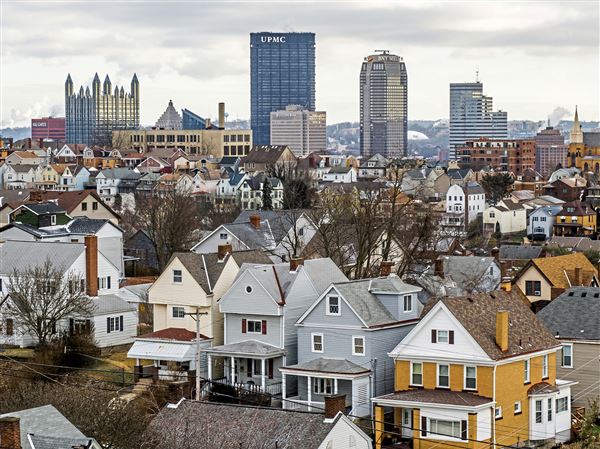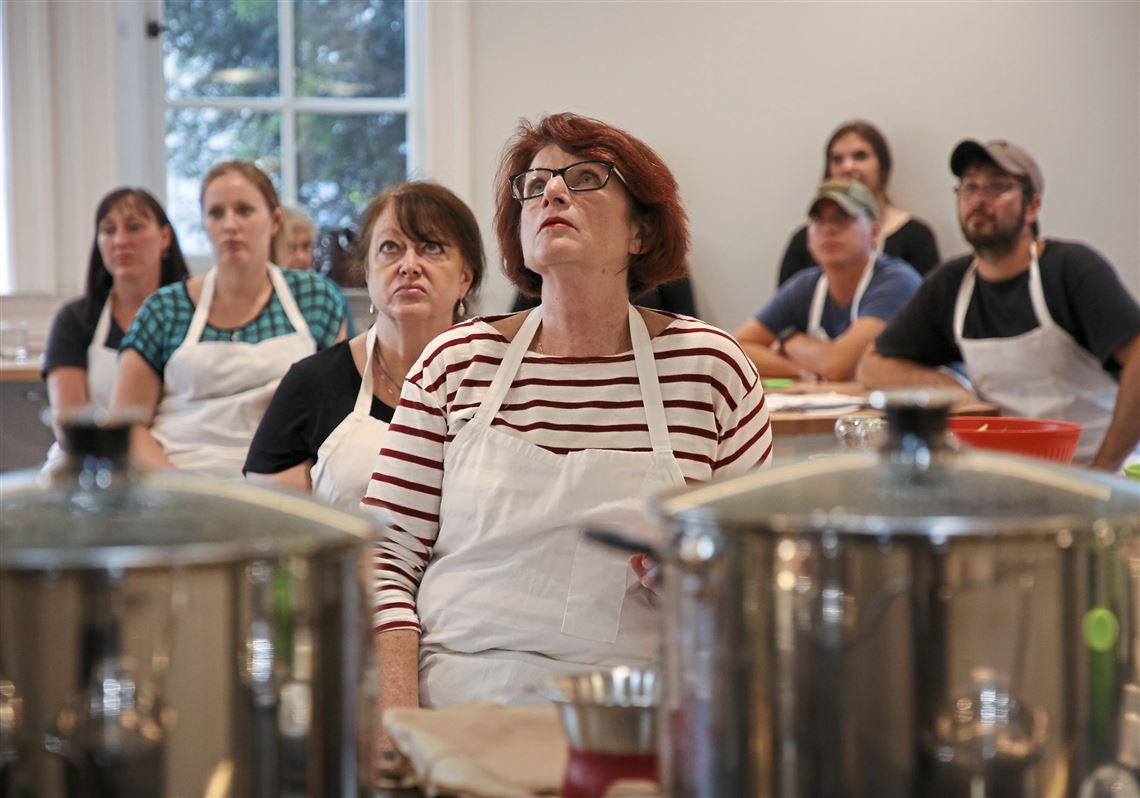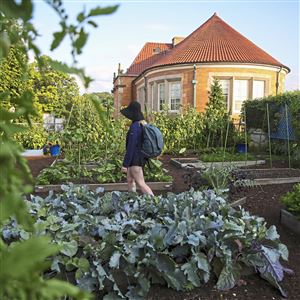Phipps Conservatory and Botanical Gardens. The glass house. Pittsburgh’s green oasis. Most of us have visited Oakland’s historic landmark campus, strolled the seasonal flower shows, enjoyed the plant landscapes and applauded the many awards that Phipps has won for being the greenest of green spaces.
In the past few years, there’s been an increasing emphasis on food and eating. A seasonal organic farmers’ market sets up on the sidewalk every Wednesday, and the much-lauded Cafe Phipps is now a destination lunch spot. The organic Edible Garden, voluptuous with seasonal tomatoes, pole beans and pumpkins, appeals to everyone from the preschool set to Victory garden veterans.
And now, celebrating its 125th anniversary throughout 2018, Phipps has opened the Botany Hall Kitchen. It is a state-of-the-art teaching kitchen with a full schedule of hands-on, year-round culinary programs and kids camps. Nothing random here. Class participants learn ways to prepare food that is good for people and the planet, supporting Phipps’ mission to advance sustainability. What’s going on?
“Our journey into food began in 2005 when we opened Cafe Phipps,” says Richard Piacentini, Phipps president and CEO. “We had just finished building our first LEED-certified project, the Welcome Center. During the process, we decided that we should expand LEED principles from the building to our operations and programs, too. Because part of our mission is to promote human and environmental well-being through action, a logical place to start was with the cafe where we decided to focus on local and organic foods. We also wanted the food to taste good.”
Leadership in Energy and Environmental Design (LEED) is a set of rating systems for the design, construction, operation, and maintenance of green buildings, which was developed by the U.S. Green Building Council.
“Food is a great way to bring people together to talk and learn,” continues Mr. Piacentini. “Everyone has to eat. Along the way we decided to focus on foods with no hormones and antibiotics in meat, no rBST in milk, cage-free eggs and no factory-farmed meats. We decided to eliminate GMOs, not out of health concerns, but because of the type of agriculture most of the foods produced by this method supports. We also follow the Environmental Working Group’s Dirty Dozen list for pesticides in produce. In 2011 we started our Let’s Move Program on children’s health and eliminated junk food. We replaced soda with a fruit juice and sparkling water drink we call Phipps Splash.”
Now Phipps is focused on eliminating single-use plastic, having already eliminated plastic disposable serviceware in 2005 and bottled water in 2009. Gone, too, are canned goods and thermal cash register receipts due to exposure to BPA.
“With all this focus on food, we realized all we need is a really good kitchen,” Mr. Piacentini says. Then he breaks into a grin. “Now we have it. And a whole new world of opportunities has opened up.”
Cooking up quality
Cooking teachers are plentiful in Western Pennsylvania. But good teaching kitchens are few, likely poorly equipped and most all could use a facelift. There are few exceptions. In contrast, the Botany Hall space is A-plus amazing.
The upfront instructor area is equipped with overhead cameras, which project the action onto three overhead monitors for multiangle demo views, so attendees never miss a whisk or a trick. The 20-foot counter runs the length of the room and is wide enough to double as a serving buffet. The “stove” heating elements are neither gas nor electric; they are induction burners. There is a deep, wide three-section sink for washing up and sanitizing, and hand-washing stations for the students. Class participants sit on adjustable stools, four to a butcher block table. Signs over waste containers — compost, recycle and landfill — remind students to be environmentally thoughtful with the garbage. The room holds 18 for participation classes, more for demonstration classes.
The space, designed by architect Felix Fukui and the Phipps team, is contemporary, starkly white and black with subtle spot and recessed lighting. The curved back wall of windows floods the room with daylight. When a class is filled with an eclectic mix of students, a happy sound-track is humming in the background and beautiful baskets of fruits and vegetables are awaiting their fate as aromas begin to wisp out of burbling pots, the space becomes vibrant, alive with color and sound.
The soft opening of the kitchen was in May. Since the inaugural class, instructors have been road-testing the space.
In recent weeks a canning-pickling class was held there, attended by six men and eight women. taught by Susan Marquesen, a Penn State master food preserver and gardener who also taught at the Phipps Garden Center in Shadyside for about five years.
“I was a little apprehensive about the change,” she says. “But I got over that as soon as I started working in this professional space. The appliances are amazing.The induction “burners” are so efficient and heat so fast, I’m still adjusting to them.”
An induction cooktop delivers almost instant heat, and it heats only the cookware and not the induction surface upon which the pot is placed. How? The power and precision of the technology comes from an electromagnetic field below the glass cooktop surface that transfers current directly to magnetic cookware, causing it to heat up.
Essentially, induction cuts out the intermediate step of heating up a burner and then transferring the heat to the pot. This type of cooking technique is up to 70 percent more efficient than either conventional electric or gas. But, special cookware is needed for induction cooking. At Phipps, All-Clad induction cookware is the house brand.
“One of the nicest perks at Botany Hall is the support staff,” says Ms. Marquesen. “Phipps volunteers assist in class, chopping here, washing up there, second-guessing my needs. I couldn’t teach a class without them. The space works, the students are hands-on and engaged. I get a huge response and feedback from my students.”
Debbie Edwards of Mt. Lebanon has taken three cooking classes with Ms. Marquesen in Botany Hall this summer. “I’m a beginning pickle maker, and I need to see what mixtures look like, and what’s going on in those big kettles. Thanks to the monitors, I have a ringside seat without even standing up. The handouts are great, and kitchen is so airy and new. I’ll be back for more classes in the fall.”
Dennis Saltzman of Greenfield stumbled onto the class online. “For years, I’ve watched my dad bring home bushels of cucumbers, peppers, tomatoes and more. He canned and pickled everything,” Mr. Saltzman says. “Now Dad’s turning the pickling reins over to the kids. I’m here to get familiar with the science and the process.”
It’s still early days for the kitchen, and there is much new programming to come. Perhaps traveling-teacher demo-classes, a wine and beer program, special guest chefs, tastings with Slow Food Pittsburgh and continued kids’ programs.
To celebrate the opening of the kitchen, Phipps is presenting a festive day of fresh, seasonal and healthy treats during the annual Tomato and Garlic Day, this year on Aug. 26. There will be an outdoor food market on Phipps’ front lawn. And three cooking classes will be demonstrated in Botany Hall. Space is limited, and advance registration is required at phipps.conservatory.org/tomato
Phipps suggests that visitors park free in the island in front of the main entrance or on the metered streets throughout Schenley Park.
For information on coming adult and kids cooking programs, check phipps.conservatory.org or pick up a copy of Grow, the Phipps catalog of classes and programs.
Marlene Parrish can be reached at marleneparrish@icloud.com or 412-481-1620.
First Published: August 21, 2018, 10:31 a.m.
Updated: August 21, 2018, 10:36 a.m.

















